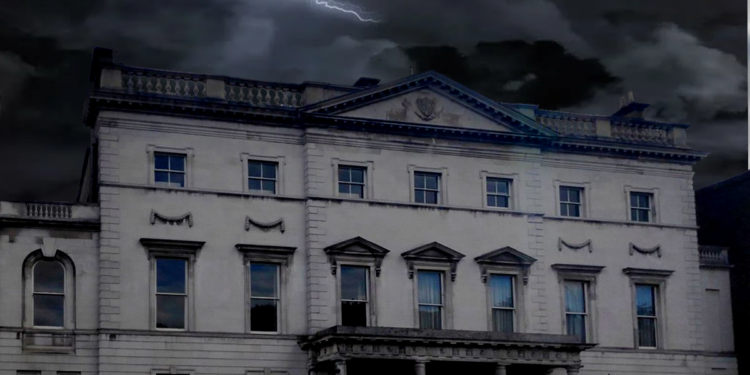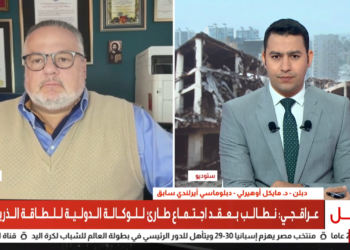by Miceál O’Hurley
DUBLIN — A multitude of events, large and small, led to the Russian invasion of Ukraine in 2014. The red-line in Russia’s current invasion of Ukraine which began on 24 February 2022, however, was Putin formally recognising the illegal ‘break-away Republics’ in Luhansk and Donetsk as independent states. It is not coincidental that Putin used the recognition of these occupational regimes to launch combat operations against Ukraine.
It has not escaped the notice of the international community that Putin signed the instruments granting the Russian Federation’s recognition of the occupation regimes in Luhansk and Donetsk using the identical language he used on 26 August 2008 granting Russia’s recognition of two regions of Georgia—Abkhazia and Tskhinvali. The parallels between Putin’s use of the occupation regimes in Georgia and those in occupied Ukraine are both striking—and frightening. Analyst content that when Putin is finished with Ukraine he may well decide to finish the destabilisation and destruction of Georgia in his quest to rebuild an imperial, greater Russia. Moldova, which also suffers a Russian occupation regime, now looks on with weary eyes.
Information given to Diplomacy in Ireland – European Diplomat, including documents, interviews, confidential statements and photographs beginning in 2021 have painted a deeply worrying picture about what diplomats serving in Ireland, Brussels and Vienna detail as a bifurcation between Ireland’s public stance in condemning Russian occupation regimes and conduct within the Department which seemingly undermines that position over a long period of time.
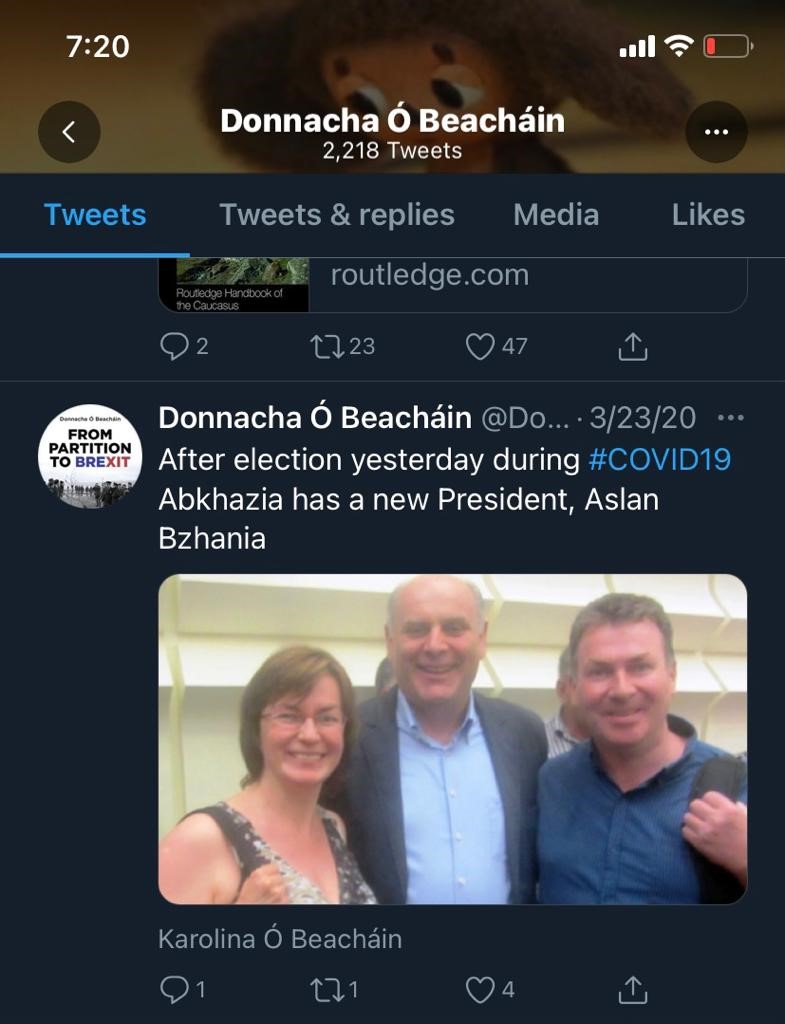
At least one senior official in Ireland’s Department of Foreign Affairs, specifically in the section overseeing the “European Neighborhood,” has been at the centre of the rankled relations between Ireland and its international partners. According to several senior diplomats serving in Ireland, Brussels and with the Organisation for Security and Cooperation in Europe (OSCE) and the North Atlantic Treaty Organisation (NATO), the Department hired a Deputy Director whose academic writings, public posts on social media, writing for what have been called ‘pro-occupation regime‘ web sites have troubled Ireland’s European and international partners. It was a photograph of the now Deputy Director in the Department of Foreign Affairs, smiling and embraced by the leader of the Russian occupation regime in Abkhazia, Georgia that set-off a firestorm of concern.
The idea the Department of Foreign Affairs would hire and entrust the European Neighbourhood and OSCE portfolios to someone they complain has a history of sympathising with an occupation regime in Georgia, a regime tied to what the Grand Chamber of the European Court of Human Rights (ECHR) declared human rights abuses, including torture, sent alarms ringing in European diplomatic corridors. The situation has reportedly been brought to the attention of the Department of Foreign Affairs several times only to be dismissed. One Ambassador serving in Ireland states he raised the issues with members of the Oireachtas Joint Committee on Foreign Affairs and Defense without the matter being resolved.
Ms. Karolina Ó Beacháin, a Deputy Director in the Department of Foreign Affairs, is a well-educated professional. Attempts to verify her dates of hire, service, title and responsibilities within the Department of Foreign Affairs were unsuccessful due to a refusal by either Ms. Ó Beacháin or the Department of Foreign Affairs to engage by providing information, clarify the record or make comment prior to publication.
However, her critics claim the Deputy Director has demonstrated considerable sympathy with a Russian occupational regime which undermines confidence in Irish foreign policy and the Department that administers it. Most troubling, several diplomats and senior officials complain that she has used her position overseeing the Department’s portfolio for the European Neighbourhood and OSCE to create “obstacles to good relations“. Numerous interviews convey as sense she provides lackluster cooperation with what one Ambassador called, “Europe’s true partners“, where Russia and their illegal occupation regimes are at issue. The assertion that Russia continued to receive preferential treatment by Ireland despite its illegal occupations and history of poisoning, murders, extra-judicial killing of journalists, imprisoning of democratic civil society actors and even Russian cyber-attacks on the Health Service Executive makes for a sordid story. It is story not without some verifiable support.
The world community, including Ireland, has been consistent in its official condemnation of the Kremlin’s support for the use of military force to install occupational regimes in Moldova, Georgia and Ukraine. While some argue these territories represent “breakaway” independence movements, the ECHR found in Georgia v. Russia II decision in 2021, a case which involved torture and human rights abuses amongst other matters, Russia exercised ‘effective control’ over occupied Georgian territory. These are no independence movements rooted in a rules-based world order to which Ireland subscribes but Russian occupation regimes.
The matters complained of by senior diplomats and officials in Dublin, Brussels and Vienna are unsettling and come on the heels of a long series of scandals and un-forced errors at the Department of Foreign Affairs. In the last year alone, an attempt by Foreign Affairs Minister Simon Coveney to appoint a close friend to a United Nations posting raised such concern that the nomination was withdrawn, telephone records were demanded by media outlets and text messages and other communications were found to have been erased in what appeared to be violations of the GDPR and Freedom of Information Act. The whiff of an attempted cover-up permeated the air in Dublin and the destruction of records has caused Members of the Oireachtas to complain it deprives them of ability to discharge their obligations as elected representatives and provide oversight and raise issues of accountability.
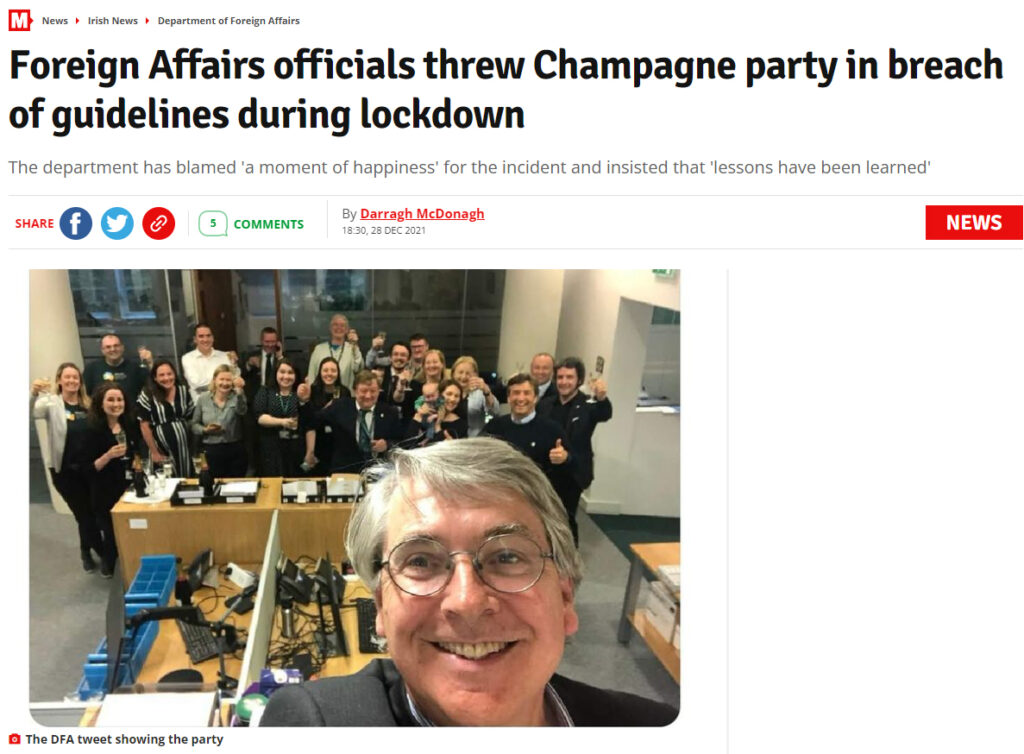
Soon after, the former Secretary General of the Department of Foreign Affairs and staff in Iveagh House showed flagrant disregard for the same Covid-19 restrictions imposed on the public and held a champagne party. Attempts to evade responsibility by describing the episode as a “momentary lapse in judgment” and a “moment of happiness” defied reasoning as the accessing of alcohol, notifying of people to participate, the number of people participating and the direct involvement and photographing of the event provided ample opportunity for sound judgment to be displayed. For 21 people to all feign ignorance of public health guidelines during a pandemic that was claiming Irish lives, or to simultaneously experience a “momentary lapse in judgment” brought on by “happiness” beggars the imagination. These outrageous excuses employed in attempt to escape accountability resulted in public trust and confidence in the Department of Foreign Affairs, its Minister, Simon Coveney, and the new Secretary General, Joe Hackett plummeting to even new lows.
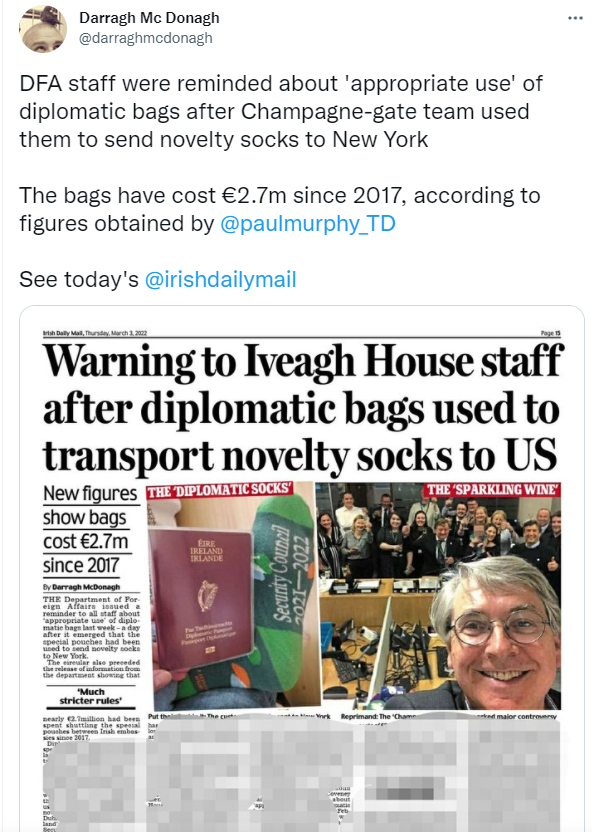
Compounding the Departments woes was a report by Darragh McDonagh in the Irish Independent on 22 February 2022 (just two days before Russia began its latest invasion of Ukraine) entitled, ‘Champagne party’ team spent €4,500 on novelty socks in Ireland’s bid to win UN Security Council seat – Some of the socks were sent to New York in a diplomatic bag. The Department purchased the socks from a New York vendor, had them delivered to Dublin, then sent them back to New York using an official diplomatic bag carried by a diplomat enjoying diplomatic immunity so they could be used in an attempt to sway United Nations Permanent Representatives to vote for Ireland’s bid to enjoy a non-permanent seat on the UN Security Council. Recently produced public records show the €4,500 socks were part of a larger spend in excess of €125,000 for trinkets distributed amongst well wishers.
According to a Tweet by journalist Darrah McDonagh reposting an article he wrote for the Irish Daily Mail on 3 March 2022, the Department of Foreign Affairs had to warn staff not to continue to abuse diplomatic bag privileges. The Department of Foreign Affairs issued a memorandum to all staff about ‘appropriate use’ of diplomatic bags last week – a day after it emerged that the special pouches had been used to send novelty socks to New York. The circular also preceded the release of information from the department showing that nearly €2.7million had been spent shuttling the special pouches between Irish embassies since 2017.
It appears that it takes public exposure of the Department of Foreign Affairs mismanagement to cause any change. However, there remains to indication that a ‘root and branch‘ review of the dysfunction that prevails at Iveagh House will ever take place.
According to reporting by McDonagh in his 22 February 2022 article: The spending was described as “farcical” by senator and member of the Oireachtas Foreign Affairs Committee, Gerard Craughwell, who said the revelation had accentuated the image of the department’s civil servants as a detached elite following the Iveagh House controversy earlier this year. “The practice of using international rock stars, corporate gifts of umbrellas and socks – God help us – must stop. It is an insult to the suffering people who look to the UN to protect and care for them,” he said. “The only people who benefit from this happy-clappy party that is the obscenity of the UNSC election are the already well-heeled diplomats who live privileged lives.”
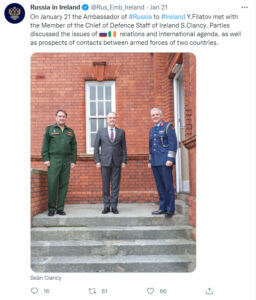 The litany of instances of poor judgment, use of Department resources and time for trinkets while important work went ignored, attempts to evade accountability by destroying records and hoping to pass bad acts off as “momentary lapses” has severely injured the Department and Coveney. Coveney is said to have created a further misstep when the Chief of Staff of the Defense Forces received the Russian Ambassador, Mr. Yuriy Filatov and the Russian Military Attaché, who used the opportunity to release a staged photograph of the meeting and allowing the Russian’s to characterise it including “prospects of contacts between armed forces of [Russia and Ireland]“.
The litany of instances of poor judgment, use of Department resources and time for trinkets while important work went ignored, attempts to evade accountability by destroying records and hoping to pass bad acts off as “momentary lapses” has severely injured the Department and Coveney. Coveney is said to have created a further misstep when the Chief of Staff of the Defense Forces received the Russian Ambassador, Mr. Yuriy Filatov and the Russian Military Attaché, who used the opportunity to release a staged photograph of the meeting and allowing the Russian’s to characterise it including “prospects of contacts between armed forces of [Russia and Ireland]“.
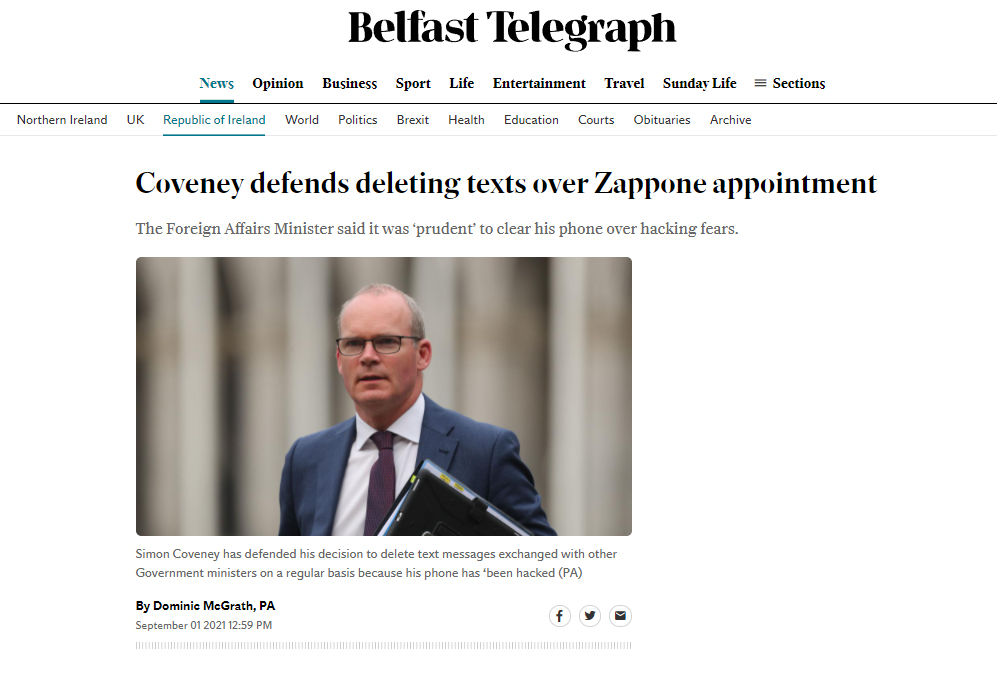 The meeting and photograph took place at a time when Russia was in its final stages of preparation to invade Ukraine. It was ill timed and it having taken place in this context raised serious questions about the Department and Defense Forces being adrift, riddled with poor decision-making and detached from public opinion and accountability. The Department of Foreign Affairs failed to release any clarifying Statement on the matter for days, making matters uneccessarily worse, resulting in the public impression the Russian propaganda was accurate and Ireland was cooperating with Russia in the lead-up to the invasion of Ukraine.
The meeting and photograph took place at a time when Russia was in its final stages of preparation to invade Ukraine. It was ill timed and it having taken place in this context raised serious questions about the Department and Defense Forces being adrift, riddled with poor decision-making and detached from public opinion and accountability. The Department of Foreign Affairs failed to release any clarifying Statement on the matter for days, making matters uneccessarily worse, resulting in the public impression the Russian propaganda was accurate and Ireland was cooperating with Russia in the lead-up to the invasion of Ukraine.
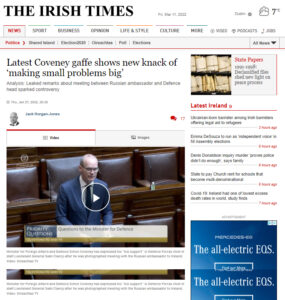 Memes and derisive social media posts by the general public were directed at the Chief of Staff, General Clancy, and sources inside the Defense Forces expressed being “furious Coveney hung him out to dry“. In a subsequent meeting, it has been reported that Coveney administered what was tantamount to a reprimand or censure to General Clancy. Irish Times writer Jack Horgan-Jones captured quite accurately the mood of the nation and views of political insiders in their headline of 27 January 2022, Latest Coveney gaffe shows new knack of ‘making small problems big’ Analysis: Leaked remarks about meeting between Russian ambassador and Defence head sparked controversy.
Memes and derisive social media posts by the general public were directed at the Chief of Staff, General Clancy, and sources inside the Defense Forces expressed being “furious Coveney hung him out to dry“. In a subsequent meeting, it has been reported that Coveney administered what was tantamount to a reprimand or censure to General Clancy. Irish Times writer Jack Horgan-Jones captured quite accurately the mood of the nation and views of political insiders in their headline of 27 January 2022, Latest Coveney gaffe shows new knack of ‘making small problems big’ Analysis: Leaked remarks about meeting between Russian ambassador and Defence head sparked controversy.
This penchant for either ignoring problems, or ‘making small problems big‘ feeds into senior Ambassadors, diplomats and officials views that the lack of good relations and obstacles being created within the Department of Foreign Affairs is undermining European confidence in Ireland. Moreover, two of these individuals, one in and one in Brussels, indicated during interviews they believe the Department of Foreign Affairs’ “dysfunctional management and poor decisions on issues both large and small” combined with Coveney’s domestic disarray challenges have distracted Ireland from the issues of the Russian invasion of Ukraine and the crisis it presents for European security.
In 2021, Diplomacy in Ireland – European Diplomat was given information by multiple sources, including four ambassadors accredited to Ireland, a diplomat at the Organization for Security and Cooperation in Europe (OSCE) and two independent researchers concerning a pattern of what was described as “non-cooperation and obstructionism” in Ireland’s Department of Foreign Affairs concerning the European Neighborhood. The documentation included numerous academic articles from a Deputy Director in the Department of Foreign Affairs, Karolina Ó Beacháin, who has specific responsibility for Ireland’s OSCE and European Neighbourhood relations. This raises new concerns about Coveney’s judgement and the decisions being made inside the Department of Foreign Affairs.
Several of Ms. Ó Beacháin’s articles, published over a number of years, as well as her social media posts, have been reviewed by two academics and diplomats. The consensus is that her published works and activities suggest a position all but uniformly critical of Europe’s refusal to recognize the illicit occupation regimes in Abkhazia and South Ossetia and advocating for their recognition as lawful entities. Such views would put her on the wrong side of international law. In a white paper, Gender and political representation in the de facto states of the Caucasus, published after a conference in Yerevan, Armenia in 2015, Ó Beacháin voiced criticism for the plight of women’s lack of agency in Abkhazia, attributing it to the EU and United Nation withholding funding because of their status as an occupying regime, “Unlike other states in the region, Abkhazia has not received international assistance and funding to promote women in politics and to develop women’s civil society organisations that have been available for other post-conflict situations and to support transitions in the post-communist states.”
Russian occupation of Moldova, Georgia and Ukraine have also been condemned by the international community. Resolutions from the United Nations, European Union and nations across the globe all objecting to Russia’s effective control over occupied territories of sovereign states giving voice to the incontrovertible condemnation of all Russian occupation regimes.
International law is clear, the sovereign and internationally recognised borders of countries are inviolable. Article 2(4) of the United Nations charter provides “[a]ll Members shall refrain in their international relations from the threat or use of force against the territorial integrity or political independence of any state, or in any other manner inconsistent with the purposes of the United Nations”. Ukraine, Georgia, Moldova and Russia are signatories to the UN Charter, as is Ireland. Still, Russia has used force of arms and the ruse of supporting “breakaway republics” to destabilise each country, install puppet regimes under their effective control and invariably commit human rights violations to gain and maintain hold over the sovereign territory of their neighbours.
Her efforts to avoid labelling Russia as a power with ‘effective control’ over Abkhazia, as did the European Court of Human Rights in Georgia v. Russia (II), or preferring to appropriately label it an illegal occupational regime appear only in the footnotes to the article. Ó Beacháin employs language that obscures the true nature of Abkhazia as being illegally occupied, writing, “Throughout this article the words ‘parliament’, ‘legislature’, ‘state’ are used to refer to any of the institutions, bodies or titles currently employed within Abkhazia, to avoid cluttering the text by using the terms de facto or ‘self-declared.…’”
Ms. Ó Beacháin’s preference to use legitimising terms and refrain from citing the regime as being an illegal, occupying entity, under the ‘effective control’ of Russia out of any claimed concern for “cluttering the text,” shows significant, preferential bias towards the occupying Russian-controlled regime. The employment of terms with positive agency such as ‘de facto’ and ‘self delcared’ in lieu of ‘occupying’ and ‘illegal’ is intellectually misleading and academically dishonest. The same is true for Ó Beacháin’s use of legitimising terms like ‘parliament’, ‘legislature’, or the most offensive claim to being a ‘state’. Her other writings in the public domain present equally if not more sympathetic leanings toward the views of illegal occupational powers.
Unquestionably, what one publishes as an academic is protected, as it should be, by the constitutional principle of freedom of expression and academic freedom. However, when a person holding such dubious views is hired by the Department of Foreign Affairs to discharge duties with significant influence over how Ireland deals with states like Georgia, Ukraine and Moldova, each which suffers illegal occupation regimes in at least a part of their territories, it raises a legitimate issue of public importance, “Why did the Department of Foreign Affairs hire a senior Deputy Director who is known to hold views hostile to Ireland’s international partners in Europe and that run contrary to international law”?
When this information was given to members of the Dáil Éireann, the Irish parliament, there was an expression of concern and frustration. However, it was indicated that this would be dealt with in ‘closed session’ of the Joint Committee on Foreign Affairs and Defense. Members expressed concern that the Department of Foreign Affairs would assert that it is a ‘personnel matter’ and refuse to engage with the Dail. It remains uncertain if the matter was ever considered in private session by the Joint Committee on Foreign Affairs and Defense despite its seriousness and implications or the issues raised by the Committee with the Department.
At least one senior member within the Department of Foreign Affairs as well as a retired Irish diplomat expressed the belief there would be hostility to questioning the Department’s judgment. Three other individuals close to the matter described it as “old news” and that it “wasn’t important.” Attempts to ask questions on this matter resulted in significant hostility, even threats through intermediaries, that efforts to inquire further would lead to “repercussions”.
In January 2022, a photograph emerged showing the Deputy Director of the Department of Foreign Affairs embracing a person described as the ‘President’ of Abkhazia. The photograph, dated March 23, 2020 and appeared on the public Twitter account of the Deputy Director’s husband, an academic, also indicates Ms. Ó Beacháin was tagged in the photo and was aware of its existence. The photograph, which shows the Deputy Director with an exuberant smile, her arm around Aslam Bzhania, described as the ‘new President.’ Her casual clothing seemingly indicates that the visit to occupied Abkhazia was a private visit and the photograph was voluntary and specifically not connected with official functions where people are often photographed as part of their official duties standing next to disreputable persons. Even on those occasions it is customary to exercise due care so the photograph doesn’t convey the impression of joy, close relations or endorsement, especially where the subject is involved in a remine known for human rights abuses under Russian ‘effective control‘.

The President of Georgia is Ms. Salome Zourabichvili. Abhkazia is internationally recognised as being the sovereign territory of Georgia. Ireland, the European Union and United Nations deny the right of Abkhazia, or any occupied territory, to hold elections and have declared such ‘elections’ illegitimate and in clear violation of international law. Elections in occupied Ukraine are also considered invalid and unlawful.
The Deputy Director’s biography conveys seniority and experience. The site Dublin City University’s Institute for International Resolution and Reconstruction, shows her biography stating, “She knows the post-Soviet space well, having lived and worked in the region as a Parliamentary Program Manager for National Democratic Institute for International Affairs in Georgia; an OSCE/ODIHR expert in an on-going ‘Women in Political Parties’ program, a Netherlands Institute for Multiparty Democracy (NIMD) consultant and as an independent election observer in the de facto states of Abkhazia, Transnistria and Nagorno Karabakh”.
Accordingly, Ms. Ó Beacháin’s would be well-aware of the positions of Ireland, the European Union and United Nations on the illegality of elections held in occupied territories. Nonetheless, she appears in photographs on social media with an individual who claims to be ‘President’. The post appeared on her husband’s Twitter feed appeared while it was still accessible as being ‘liked’ by her.
Ms. Ó Beacháin was provided copies of the posts, as was the Department, prior to publication. Prior to publication, an attempt was made to determine if this images and other questionable posts remained on the social media accounts of either Ms. Ó Beacháin or Professor Ó Beacháin. They were not found which would generally indicate they had been ‘scrubbed‘ out of concern their content would be the subject of reporting on the issue.
If the academic writings and public posts on social media and blogs promoting the recognition of illegal occupation regimes in Georgia were not disqualifiers for her position, her posting would have foreseeably invited concern and disdain from Ireland’s international partners. Ambassadors and diplomats in Ireland, the OSCE and NATO expressed concern about working with Ireland through an official who associates with leaders regimes found to be human rights abusers, if not war crimes perpetrators, by the UN Commission on Human Rights. One senior Western European diplomat, who agreed to discuss the issue without attribution, described the situation as leading to “a deterioration of trust and confidence” with Ireland’s Department of Foreign Affairs.
Any individual holding the position of Deputy Director for the European Neighbourhood and OSCE would presumably be expected to observe the foundations of international law as well as the Irish government’s stated support for the territorial sovereignty of Georgia, Moldova and Ukraine. Being photographed embracing a person described as president of an illegal occupation regime, and equally questionable publications, raises concerns about substantive conflicts between her personal views and professional obligations to the Irish Government and rule of law.
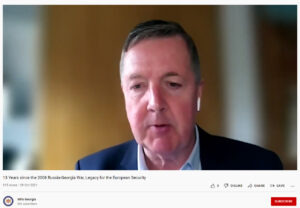
In only one example of the kind of lack of cooperation from the Department and Ms. Ms. Ó Beacháin, two different sources reported an instance in which the Department withheld cooperation from occupied Georgia where Abkhazia was at issue. On 27 October 2021, the Embassy of Georgia held a webinar, Webinar: 13 Years since the 2008 Russia-Georgia War, Legacy for European Security.
According to a well-placed and knowledgeable source inside the Department, as well as one within the diplomatic community in Dublin, the Department refused to participate in the conference in which the illegal occupation of Georgia’s Abkhazia region would be discussed by a panel of experts and the Ministry of Foreign Affairs of Georgia. Both sources confirmed their belief Ms. Ó Beacháinthe Deputy Director would have had influence over this decision as Georgia falls within the European Neighbourhood and OSCE over which she retains purview.
Sources have opined they believe her personal relationship with the occupational regime leader in Abkhazia, Alsan Bzhania, with whom she was photographed, and her husband’s campaign to promote a stance of non-cooperation with Georgia and Ukraine influenced the decision for the Department not to participate in the webinar. It is our information that Ambassador Zurabashvili, the Ambassador of Georgia in Ireland, then invited retired Admiral and Defence Forces Chief of Staff Mark Mellett to moderate and participate in the panel. It is routine for the Department to co-sponsor webinars with Embassies. Ireland’s willingness to participate in webinars with multiple other Embassies and international organisations across the globe raises concerns about why a Deputy Director in the DFA with responsibility for the European Neighbourhood and DFA, both of which include Georgia, is reported by well placed sources to oppose Ireland’s participation in a webinar when the illegal Abkhazia occupational regime with whom she has associated is the subject of discussion.
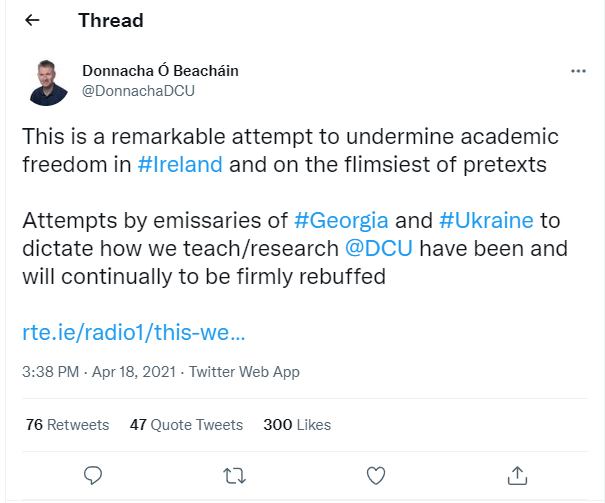
The situation has become increasingly complicated. Professor Donnacha Ó Beacháin, Ms. Ó Beacháin’s husband, has engaged in an unusually public campaign on television, radio and on social media attacking the Embassies of Georgia and Ukraine. The Ukrainian and Georgian Embassies in Dublin had complained that academic freedom was being abused by giving Russia a platform to lecture Irish students with unfounded propaganda. Each Embassy had expressed significant concerns about Professor Ó Beacháin providing an academic platform for a Russian academic to espouse propaganda and engage in Russia’s penchant for hybrid warfare under the guise of ‘academic freedom‘ and offering students ‘alternative views‘. In August 2021, Professor Ó Beacháin called upon academics to avoid all association with Georgian and Ukrainian diplomats.
The letter to Professor Ó Beacháin is admittedly clumsy and might well have been better handled through other forums. However, the public campaign to create difficulties for the Georgian and Ukrainian Embassies, both of which were occupied by illegal Russian proxy-regimes, gave every appearance of disproportionality. The result was tensions between Professor Ó Beacháin and the Embassies as well as between the Embassies and DFA.
Complaints by Professor Ó Beacháin that his academic freedom was infringed upon by the Ukrainian and Georgian Embassies is at odds with the legislation he cites. The Universities Act, 1997 states at 14. (2), “A member of the academic staff of a university shall have the freedom, within the law, in his or her teaching, research and any other activities either in or outside the university, to question and test received wisdom, to put forward new ideas and to state controversial or unpopular opinions and shall not be disadvantaged, or subject to less favourable treatment by the university, for the exercise of that freedom”.
There is a glaring omission in the complaint of infringement on academic freedom. The Russian academic who lectured at the request of Professor Ó Beacháin did not enjoy academic freedom within Any review of the last week would demonstrate that Russia’s curtailing of foreign media, cutting the Russian population off from world media and arresting citizens for protesting the war, even wearing the blue and yellow colours of the Ukrainian flag, would show that Professor Ó Beacháin was subsidising an illiberal society where academic freedom is meaningless.
Both Ukraine and Georgia dismissed out of hand the idea that providing a platform to Russian academics who promote the criminal acts of the Russian government and spread propaganda were offering “alternative views” was generally accepted within diplomatic circles as being legitimate comment, even if poorly expressed. Providing a university lecture hall to a person regarded in many circles as a Russian propagandist and apologist (despite his academic qualifications and associations) to obscure being an apologist with holding ‘alternative views’ is as unjustifiable as inviting a Nazi to offer ‘alternative views’ on the Holocaust. Russia has a long history of conflating facts and propaganda as part of their hybrid warfare campaign against Europe.
Offers by Georgia and Ukraine to resolve the issue through mediation were rejected by Professor Ó Beacháin and the President of Dublin City University.
The response to this unusually public spat were made use of by Russia in their continuing hybrid warfare campaign against both Georgia and Ukraine. Professor Ó Beacháin was repeatedly praised by Russian state-controlled media and gave comments to RT, formerly Russian Television, which has extensively covered his personal dispute with Ukrainian and Georgian diplomats. This only heightened tensions with Ukraine and Georgia who have long held RT to be a Russian State propaganda channel, a consensus held by several Western nations which have banned RT as it has been deemed a propaganda arm of the Kremlin.
The ongoing campaign by Professor Ó Beacháin against Ukraine and Georgia has invariably contributed to even further concerns about his wife’s divided loyalties. Ambassadors and diplomats, especially those from occupied countries and their allies, have expressed ‘discomfort’ in dealing with the Deputy Director, Ms. Ó Beacháin, who remains in charge of their relationship with the Irish state. The combination of reported experiences of obstructionism by Deputy Director Ó Beacháin and the campaign to have Irish academics refuse to cooperate with Georgia and Ukraine, which include comments by him that they should be barred from participating in the friendship-building Erasmus programme for young scholars, has had a chilling effect on the kinds of cooperation occupied countries should expect from an EU member state like Ireland, especially as Putin wages a bloody war against these occupied countries who are strugglingfor the future survival of the European idea and values.
At least two diplomats have indicated they have raised these issue with Deputy Charlie Flanagan, who chairs the parliament’s Joint Committee on Foreign Affairs and Defense and with senior leaders in the Department of Foreign Affairs in 2021. Both indicated they had little belief their concerns would result in any change. This information has yet to be confirmed.
According to one outspoken, an counsellor with a Northern European embassy, “We can hardly complain about Professor Ó Beacháin and his treatment of our fellow diplomats to Mrs. Ó Beacháin. After all, we are aware of the difficulties in cooperation our Ukrainian and Georgian colleagues experience within DFA already. Are we really expected to protest to a person who associates with criminal occupying authorities and whose husband provides a platform to Russian apologists or the Secretary General [of the Department of Foreign Affairs] who is aware and keeps her in her role?” The frustration at the ongoing situation and lack of willingness to address it by the Department seems only to provoke further mistrust.
According to a diplomat from the Balkans who also spoke on condition of anonymity because of his country’s EU aspirations, “When a person in DFA with carriage for our area of the map doesn’t return telephone calls, declines to participate in Zoom meetings, conferences and suggests the DFA not have participants at our events or those of our partners, it is a clear sign that personal views, politics and what the Irish say, ‘jobs for the boys’ and friendship have entered into it”. The same complaints of obstructionism and unexpectedly poor cooperation have come from several diplomats from Western Europe, Eastern Europe, the Balkans, the OSCE and NATO.
Breaking the silence has been difficult because diplomats generally avoid public disputes. The Department and Ms. Ó Beacháin have declined multiple opportunities to engage, comment or provide a statement prior to publication. Russia’s brutal, ongoing invasion of Ukraine has made the frustration palpable. Western diplomats who had previously been reserved have become unified in voicing their concern that a Deputy Director who associates with the leader of an unrecognized, occupied region under the control of Russia, and whose husband is carrying-on a public dispute with both Ukraine and Georgia over objections to allowing Russian propaganda into the classroom is a yet another sign of dysfunction within the Department.
The Secretary General of the Department of Foreign Affairs, Joe Hackett, failed to respond to repeated attempts for response to the issues being raised by western diplomats and uncovered by Diplomacy in Ireland – European Diplomat. Two further written queries including one to the Department of Foreign Affairs Press Office resulted in this response:
“Thanks for your email. I have discussed this with relevant officials and we are not in a position to provide a background briefing on this particular topic. In line with all press arrangements for this Department, grateful if you could direct future requests for comment or engagement to Departmental official via the DFA Press Office and I would ask that you do not seek to contact officials directly. Thanks, Jerry." Just prior to publication, after offering Ms. yet another opportunity to comment and/or correct the record, the Department emailed the following statement, "As a matter of policy, the Department does not comment on matters related to individual staff members".
Avoidance and attempts to keep information from coming into public purview seem to be hallmarks of the Department.
Since the most recent Russian invasion of Ukraine began with Putin recognising the illegal occupation regimes in Luhansk and Donetsk, the continued assignment of a Deputy Director in the Irish Department of Foreign Affairs with known sympathies and personal contacts with an equally illegal Russian occupation regime leader is questionable, at best and dangerous to Ireland’s relations with other states. Ambassadors and diplomats serving in Ireland, as well as officials of the OSCE and NATO in Europe who have complained of their experience of “non-cooperation and obstruction” from the Department of Foreign Affairs when Russia and occupation regimes are at issue raises legitimate questions of public concern. It also gives credence to several complaints of “resistance” from Ireland’s Department of Foreign Affairs when dealing with ‘European Neighbourhood’ issues over which this Deputy Director has oversight.
Ireland’s claims of support for a rules-based world order and upholding international law are being undermined by the Department of Foreign Affairs. Ireland’s international partners are complaining that the hiring and retention of an advocate for the illegal Abkhazia regime, and her recognition of him by using legitimising terms like “President” when his regime is linked to human rights abuses shows critically poor moral and ethical judgment. A voluntary, private choice to associates such an illegal regime leader under the ‘effective control’ of the Kremlin, functionally alienates the trust and confidence of European partners who question Ireland’s commitments to international law.
In an echo of Jack Horgan-Jones’ headline, Latest Coveney gaffe shows new knack of ‘making small problems big’, one Ambassador simply mused, “Why the Minister didn’t simply transfer her to another portfolio is a question for none of us could understand. I can’t see why fighting to keep the [Deputy] Director in this role is worth alienating and offending Ireland’s friends”. Unfortunately, despite having several ‘off-ramps‘, the confrontational style and persistence on denial until problems become debilitating in the Department of Foreign Affairs seem to continue to prevail, despite a brutal year that provided many opportunities to learn lessons.
One thing remains certain, Moldova, Georgia and Ukraine have all applied for fast-track EU membership following Russia’s invasion of Ukraine on 24 February, the collective concerns that the Department of Foreign Affairs has a Deputy Director with a history of reportedly fraternising with an illegal occupational regime leader linked to human rights abuses, under the ‘effective control‘ of the Kremlin is problematic. Her position with oversight of Embassies with whom her husband is waging an ugly public campaign promoting non-cooperation is a clear of interest. The reality remains, however, Ireland’s international partners have no choice but to work with the same Minister and Department that have ‘dug in their heels’ and refused to resolve the problem which only adds another scandal to a long-list the Department has created for themselves this year alone.
That this continues while Ukraine and Georgia continue to fight, and die, to defend themselves and Europe’s future from these indisputably illegal occupational regimes supported by their Russian masters is as perplexing as it is tragic. Is a Russian cancer or simply rampant dysfunction to blame? It is in Ireland’s best interest to find out.
This story has been updated to include a missing graphic.
































